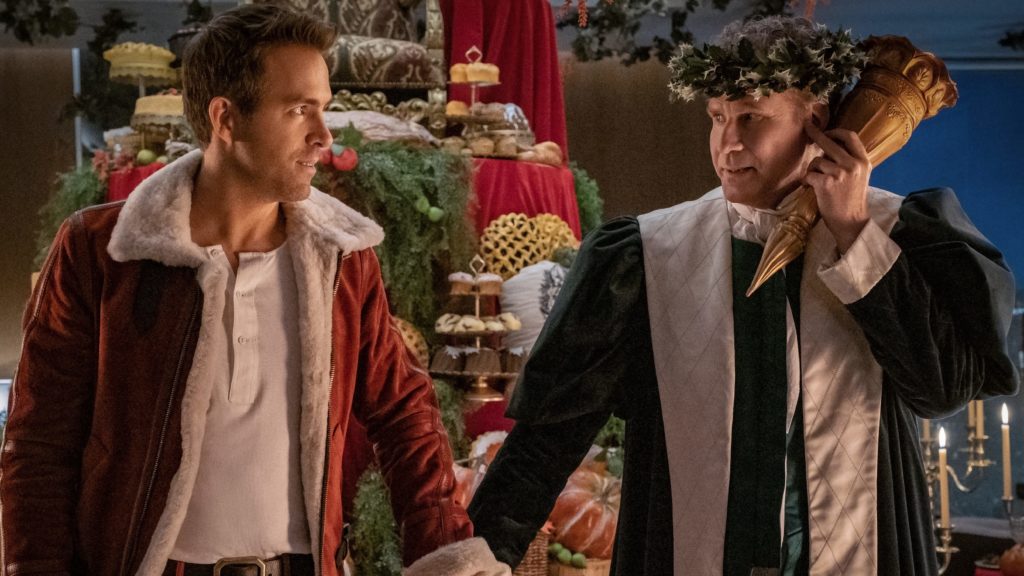Docunight Presents: Iranian Women's Stories
Four documentaries, now streaming on the Criterion Channel, embody the adopted slogan of the current protest movement: Woman, Life, Freedom


Eager to kick down the door of the official holiday season, participating in the quasi-subtlety of the commercial sales and string lights that go up earlier and earlier every year, Christmas movies in America have a tendency to enter the public sphere before the Thanksgiving leftovers have been reheated. Spirited, released on Apple TV+ on November 11th, glides through the ornament and holly-decked halls with a bang. It’s a comedic musical offshoot of Charles Dickens’s A Christmas Carol narrative, updated for a modern-day climate of political misinformation, cultural trend manipulation, and performative self-referentiality. The film wields a keen awareness of the rigor that producing a spectacle requires, and can be seen as a paean to the work of a dedicated crew toiling to elicit an emotional response and perspective shift from the film’s main antagonist as well as the audience on the other side of the screen
Spirited assumes a behind-the-scenes vantage of the spectral organization responsible for the yuletide haunting that once befell Ebenezer Scrooge nearly 200 years ago. In 2022, the ghosts of Christmas Past (Sunita Mani), Present (Will Ferrell), and Future (a ten-foot-tall reaper voiced by Tracy Morgan) convene meetings alongside Jacob Marley (Patrick Page) to scout potential targets for moral conversion. They lead a team of the recently deceased who frequently break into song and dance as they jovially carry out their administrative, research, and pre- and post-production tasks that each haunting demands. While Past, Present, and Future strategize and tailor their approach to maximize the beneficial ripple effects of their haunting program, the technical requirements of their undertakings inject a humorous layer of production realism—stagehands with ear pieces wheel in set backgrounds, transitions are queued, apathetic HR resources oversee workplace behavior, and the importance of remaining “on-script” during the haunting is repeatedly enforced.
The target, or “perp” this year, is Clint Briggs (Ryan Reynolds), the morally dubious president of a successful public relations firm that Jacob Marley considers unredeemable. Briggs has made his living sowing controversy, capitalizing on disseminated misinformation, and shamelessly manipulating cultural trends in a social media-centric world to steer conversations and public opinion to benefit his business interests; he has his hands in sectors that include pop music, Christmas tree grower unions, and politics, ranging from US senatorial campaigns to middle school elections. While Marley, comically unenthusiastic about the musical numbers, is convinced that Briggs is a lost cause, the onus of proving Briggs’s capacity for change falls upon Present.

The crux of the film’s forward momentum exists in the different viewpoints on people’s ability to change. Briggs operates on the maxim that people are fundamentally lazy, greedy, and desperate to be validated and seen as good. He is paid handsomely for his ability to pinpoint and exploit others’ weaknesses, a talent he charismatically employs on the ghosts who haunt him. Present believes even the most selfish and callous person has the capacity for a change of heart. Having once upon a time been considered unredeemable himself, he now yearns for a peaceful life among mortals with Briggs’s kind-hearted business partner, Kimberley (Octavia Spencer), with whom he’s smitten.
Spirited plays with the dimensions of performance, melding it with the narrative tropes of holiday movies and the extravagance of Broadway musicals. Briggs and Present bounce through time-bending flashbacks, flash mob songs and dances, and layers of production that wink at those behind the camera. The film is keenly self-aware of the cinematic genre in which it is participating and is full of both direct and indirect references. Present, at a Christmas costume party, bumps into a partygoer dressed as Buddy the Elf (one of Ferrell’s roles in another Christmas classic), and the credit sequence dance number ends with the camera panning to reveal the film’s beaming cast and crew who have been out of frame all along. The film reveres the production process and wrings humor from the circumstances and juxtapositions that are uniquely suited to the holiday musical genre.
In one sense, Spirited is a fun inversion of an age-old Christmas story with a timeless message. It is also a self-referential homage to a night at the theater, whether film or stage. The ghosts and their teams of ambitions and eager producers, editors, researchers, techies, and makeup artists who create a moving web of scenes designed to inspire a perspective shift in their “perp” are not so different from the filmmakers working to elicit an emotional response from us, the viewers. The film goes so far as to acknowledge this goal with the final reveal of its own cast and crew waving goodbye to the audience from behind the world of song, dance, and emotional introspection they have built for us to enjoy.
Related lists created by the same author
Four documentaries, now streaming on the Criterion Channel, embody the adopted slogan of the current protest movement: Woman, Life, Freedom
Related Movie / TV / List / Topic
This coming-of-age Mexican movie is about a group of school children who fulfill their dreams.